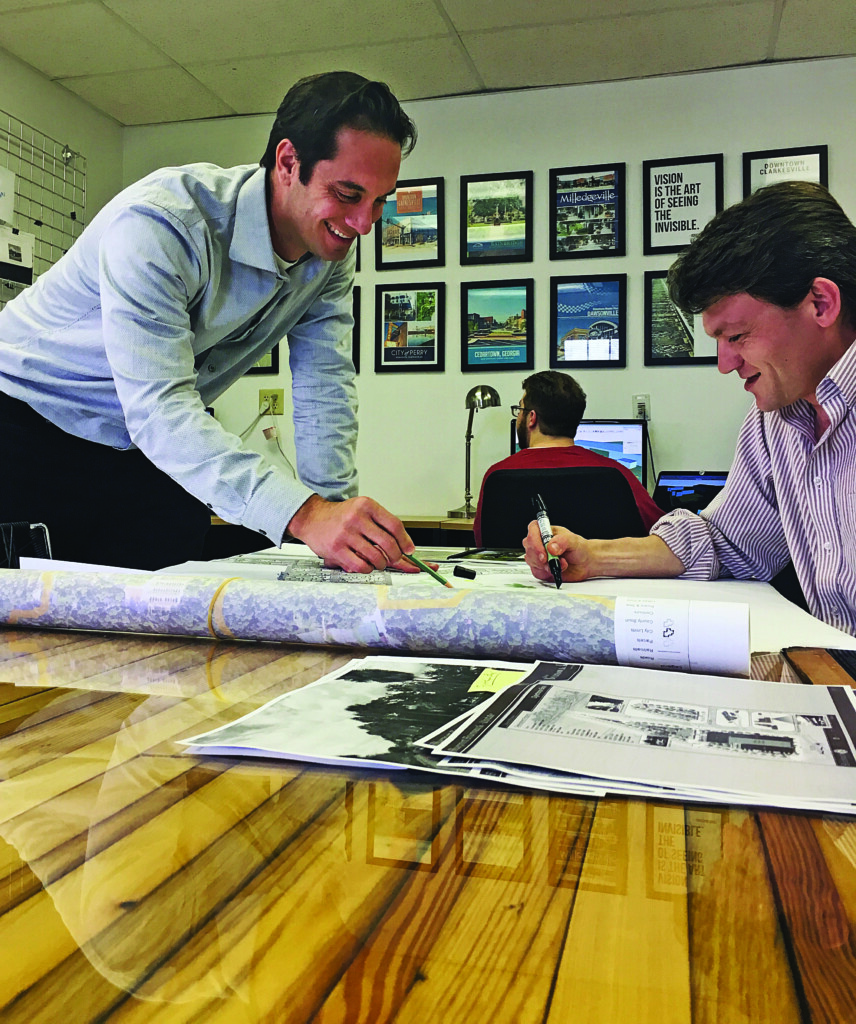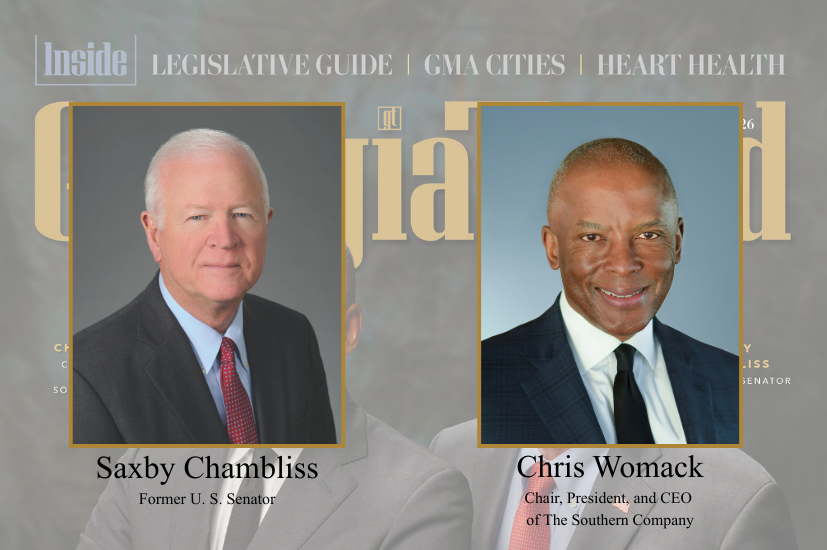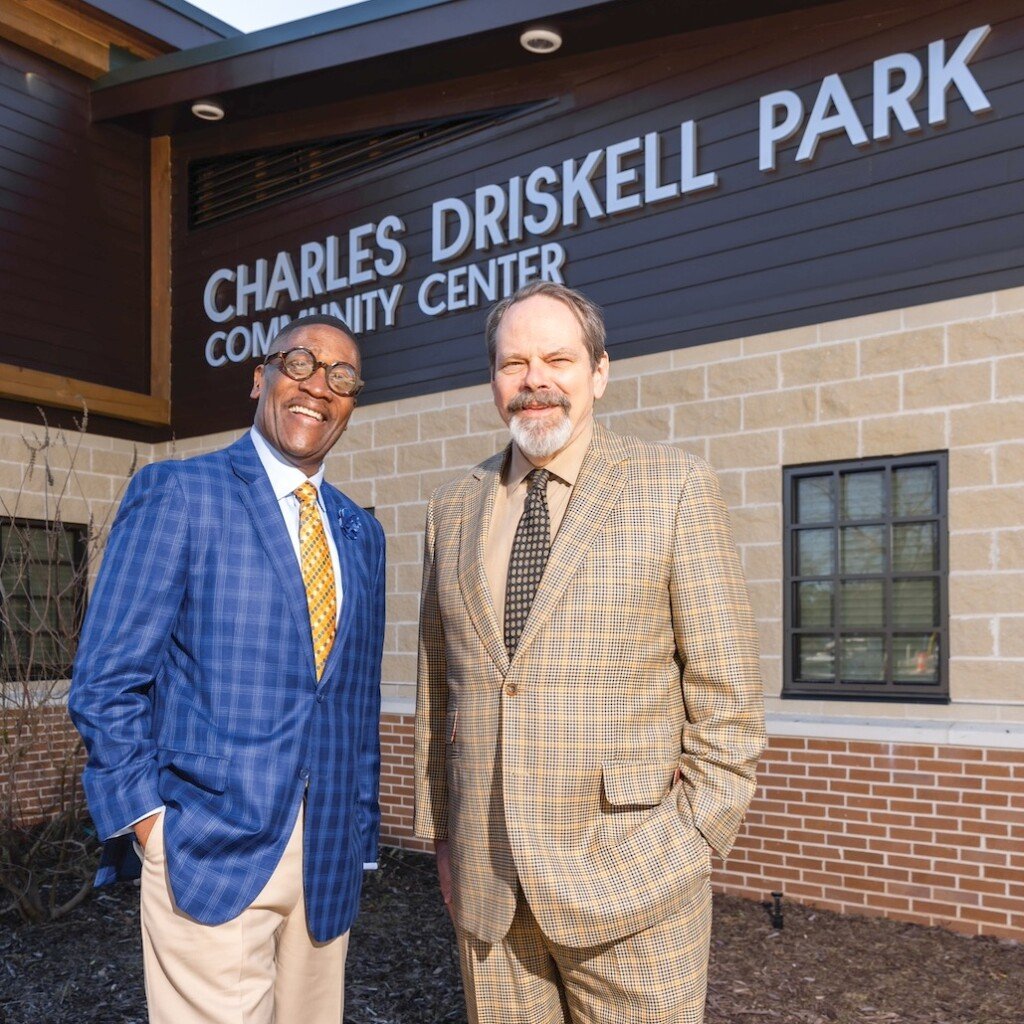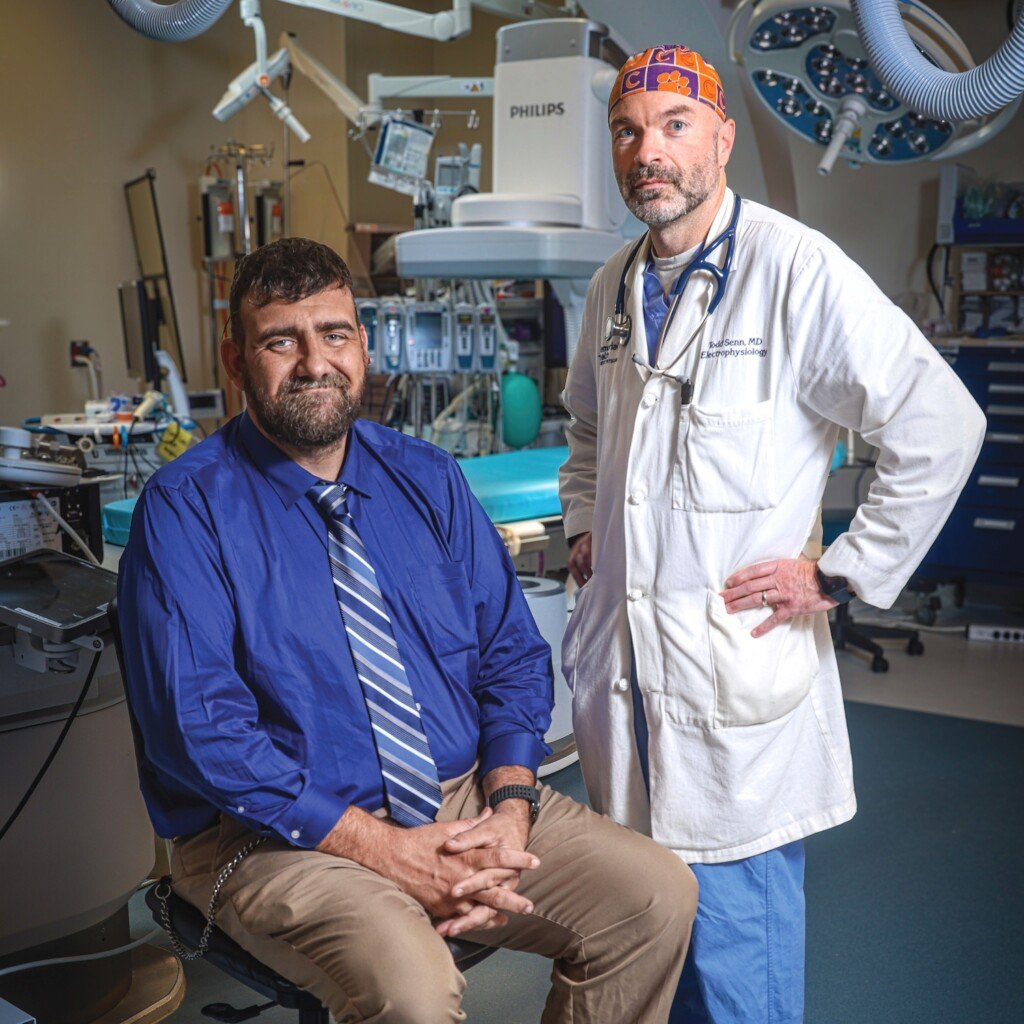UGA’s Carl Vinson Institute of Government: Experts for the State
UGA’s Carl Vinson Institute of Government educates and inspires Georgia one legislator and one community at a time.

Extraordinary Responsibility: Jennifer Frum, vice president, UGA Public Service and Outreach. Photo credit: Daemon Baizan
While the University of Georgia has long been associated with winning football, and in recent decades with rigorous academics, one of its biggest assets is an outreach program that that has a substantial and lasting impact in small towns like Homerville and Hawkinsville. Such communities, and even their government representatives, can attribute much of their success to the impact and expertise of the university and its faculty within the Carl Vinson Institute of Government.
The institute originally opened its doors in 1927 as the Institute of Public Affairs. In 1983, it was named for Carl Vinson, a Georgian from Baldwin County who served in the U.S. House of Representatives for 50 years. And today, according to Jennifer Frum, vice president for Public Service and Outreach at the university, the institute is the nation’s largest university-based provider of education and technical assistance to governments.
Before rising to her current role, Frum worked for the institute directly, beginning in 2007. She says that even then, the institute was Georgia’s top resource for state and local government, but she has seen it evolve beyond “straight-up technical assistance and training on issues important to state and local government … to providing wraparound services for communities in programming that involves government.”
Rob Gordon, director of the Carl Vinson Institute, also recognizes how the government impacts communities, and therefore, the institute as well. “The government is kind of our thing, but what we also know is that these government decisions and policies impact so many aspects of daily life across the state of Georgia, and everything from economic development to downtown redevelopment to infrastructure and community resilience, to workforce development,” he says. “So, because government policies and decisions are impacting all of those sorts of areas, we’re naturally involved in those areas as well.”
This institute is part of Public Service and Outreach (PSO) at the University of Georgia, which focuses on Georgia’s ever-changing needs, whether economic, social or community. “We’re fortunate here at the University of Georgia to have one of the largest, if not the largest, infrastructures of outreach programs in the nation,” says Frum. “The university and the state have been investing in this infrastructure for decades and decades.” Over that time, PSO has evolved and now includes eight units, including the institute.
“There is ingrained this idea that we have an extraordinary responsibility to the citizens of the state,” says Frum. “And so, it is really woven into the fabric of the way we think about ourselves. … We’re intrinsically designed to serve.”
Community Progress & Impact
The Carl Vinson Institute is actively out in communities across Georgia, working with them in various capacities. Much of the community support that the institute provides is initiated through contacts made through the trainings and programs it offers. It then works with other partners, both within the institute and outside of it, to assist communities with their needs.
In one of its programs for community work, the Renaissance Strategic Visioning and Planning Process (RSVP), the institute partners with the Georgia Municipal Association and the Georgia Cities Foundation to rejuvenate downtown areas, get citizens involved and stimulate economic development. The program is part of the overall Georgia Downtown Renaissance Partnership in which various partners help local governments revitalize their downtowns and plan for the future.
“I always say our approach is ultimately straightforward: We want to be a partner and that objective, nonpartisan problem-solver.” Rob Gordon, director, Carl Vinson Institute of Government
“[The RSVP process] provides a community-driven planning and design process that focuses on bringing together community stakeholders in a way that helps them identify what their priorities are and then establish, really importantly, a specific implementation plan for achieving those goals in the downtown,” says Gordon.
Danny Bivins, senior public service associate at the institute, runs the RSVP program and emphasizes that community interaction and feedback is paramount to the success of each plan.
For example, in the few years since Homerville began its RSVP process in 2021, the value of the city’s small downtown has increased by more than $2 million. Homerville’s evolution began with a small group of citizens frustrated with the city’s stagnation, who then got others excited about change. Jenny Robbins, chair of the Homerville Downtown Development Authority, attributes the success to both its RSVP plan and its Rural Zone designation (through the Georgia Department of Community Affairs). “We like to say, ‘don’t ask people to come to the table, take the table to the people,’ and that’s really what Danny [Bivin]’s team does,” says Robbins.

Adaptive Reuse: In Homerville, an old building (above) was renovated to become Big Daddy’s on 84 Bar and Grille (below). Photo credit: contributed
She and Laura Nipper, manager of Homerville Main Street, credit the RSVP team’s unrelenting commitment and ability to see potential in even the smallest of places, including the blank side of a building perfect for a city-specific mural to welcome residents and visitors (and a great photo spot).

Picture Perfect: The RSVP team saw potential in the blank side of a building as a place to put a mural welcoming residents and visitors to Homerville. Photo: contributed
Communities receive their RSVP plan in a written report to help them visualize potential changes and act as continued inspiration. Both Robbins and Nipper attribute those visuals to motivating and shaping Homerville’s future. “The work done by [institute] is beyond anything we could have ever hoped for, and the result is breathing new life into our community,” Nipper wrote in an email.
Homerville citizens not only want to bolster town pride with residents, they hope to attract more tourists traveling to the Okefenokee Swamp’s west entrance nearby. As part of that, Homerville now has four EV charging stations downtown, encouraging residents and tourists alike to spend time wandering the shops and restaurants while charging their vehicles.
The Vinson Institute also assisted Hawkinsville (about 35 minutes southeast of Warner Robins) with an RSVP, and the city has currently completed all short-term and intermediate goals.
“We needed help with a vision,” Shelly Berryhill, a Hawkinsville city commissioner, wrote in an email. “We knew we were willing to put in the work and effort but did not want those efforts focused on the wrong things. We asked for help in what to do and how to prioritize this list.”

Making Dreams Reality: Before and after views of an empty area between two buildings in Hawkinsville, above, which becomes a lively beer garden, shown in a rendering, below. Photo credit: contributed
An important area in which the city needed direction was “how to promote and implement the Opportunity Zone tax credits to create jobs,” says Berryhill. Hawkinsville also used the RSVP vision to apply for a Georgia Department of Transportation (GDOT) Transportation Alternative grant for improvements to Commerce Street, which led to more than $4.6 million in funding. Other awards and projects are also in the works. Before its RSVP, the city originally worked with the Vinson Institute on community branding, which is another big part of the institute’s offerings. Branding helps communities boost economic development and build community pride.
In all, 26 communities have received direct help from the RSVP program since it began in 2013. “If it’s your ideas and you are a part of something, you also have buy-in, support and motivation to move it forward,” Bivins says. “So, we really want it to be from the community if we want success to happen.”
Once a community’s desire and drive for success is clear, the RSVP staff assists each community in making its dreams a reality. “We do engagement, and we listen, and we try to figure out what the consensus issues are and come up with creative ways to address those,” says Bivins. “But in the end, someone has to wake up every day and take a vision or a plan and make it a reality and implement that. … And that’s those local communities.” Bivins acknowledges that he and his team put together effective strategies for communities, but he knows that’s only part of the job. “It’s our partners that deserve all the credit for making it happen. If not, [the plan] just sits on a shelf.”
According to Bivins, it takes about 10 years to see the results of planning, development and hard work. Gainesville developed its plan in 2013; the city worked effectively over that time and is now seeing the results – and is a top RSVP success story. In the past five years, Gainesville has attracted $318 million in private investment by following the RSVP plan developed 11 years ago. That RSVP has also led to additional projects and funding, including a recent $4.4 million in funding from the governor’s office.

Positive Feedback: Danny Bivins, senior public service associate at the Carl Vinson Institute, left, runs the RSVP program. Photo credit: Daemon Baizan
Teachers of Leaders
The Vinson Institute is well known as an objective, trusted, nonpartisan resource for government and community leaders. In the past year alone, it has provided training for nearly 20,000 elected and appointed government officials and staff across the state, plus almost 700 courses and other workshops. This training includes the Biennial Institute for Georgia Legislators, which orients new lawmakers to the legislative process and covers current policy information for new and returning legislators; the Georgia Legislative Leadership Institute (GLLI), a leadership-focused extension for selected lawmakers; the Georgia Data Innovation Hub and more.
“Our core role is to be that sort of trusted partner and resource that our government and community leaders can turn to, for a couple of things,” says Gordon. “One is high-quality educational programming, but also really data-driven research and, I like to say, on-the-ground technical assistance – all of which is designed to inform their decision-making. … I always say our approach is ultimately straightforward: We want to be a partner and that objective, nonpartisan problem-solver.”

Trained by the Institute: Former State Rep. Terry England, chief of staff for Georgia House Speaker Jon Burns
Terry England, chief of staff for Georgia House Speaker Jon Burns and a former state representative, has taken part in many of the institute’s trainings over the years. “The institute … is truly the subject-matter expert when it comes to how government is supposed to operate,” he says. In addition to the General Assembly, the institute works with city councils, boards of commissioners and others to help identify and explain key, often more technical, subjects related to state requirements or laws, such as the Open Meetings Act and Open Records Act. “I think they [at the institute] provide an invaluable service that they’re uniquely qualified to do,” England says. “That really, truly, there is no one else out there that has the capability, and a lot of that comes from just the longevity of the institute.”
Military and Green Adjustments
In UGA’s Defense Community Resilience Program, the Vinson Institute (in collaboration with UGA’s Institute for Resilient Infrastructure Systems) works with military installations and their surrounding areas to develop mutually beneficial economic-growth opportunities. Earlier this year, the program received $5 million in federal funding to support its ongoing work. The recent River Valley Community Compatible Development plan “promotes economic development opportunities that build on the natural and cultural resources in the River Valley region,” according to the plan’s website. This particular region is around Fort Moore near Columbus, and Gordon says some of those rural communities want to determine how to use land for tourism purposes, including capitalizing on the rise of electric mobility. This goal complements the military’s turn to green infrastructure.
Bivins notes how some military-linked regions are trying to foster redevelopment of small downtowns and nature-based tourism, but given the military’s green mission, that can present a problem if the communities have no green infrastructure. So, many such towns are working toward the goal of going green. Bivins points out that in any community plan, there are long-term and short-term goals to help communities move forward incrementally. The short-term goals include projects such as installing charging stations, which Buena Vista is doing as part of its broader improvements within the River Valley project.
Resiliency has often been a component of the institute’s community revitalization – such as coastal St. Marys’ issue with flooding – but Bivins recognizes it needs to become a larger focus. “As we look to the future – and especially as we do work as a Defense Community [Resilience] Program, we’re going to try to make sure that resiliency plays a stronger role in the planning/design phase,” he says. “We have to. From inclement weather and flooding and all these things that are happening with change in habitat and biomes, if we’re designing stuff for 50 years from now and we’re not thinking [about] how the world’s going to look in 50 years [as] we make these giant investments, we’re not helping,” he says.
Continued Mission

Serving the State: Greg Wilson, the Vinson Institute’s associate director of workforce and economic development. Photo credit: Sara Ingram, UGA
Each unit of UGA’s Public Service and Outreach, including the Vinson Institute, has its own specialties, but they all work to enhance the state. “It’s no exaggeration to say that these are people who wake up every day thinking about how to make Georgia a better place,” says Frum of everyone under the PSO umbrella. Greg Wilson, the Vinson Institute’s associate director of workforce and economic development, confirms that this permeates the institute. “It’s all about carrying out this mission of serving our state, of equipping leaders with the knowledge and resources so that they can make decisions to help support their communities and help support the state,” he says. “I think that mission really is embodied in every program at the institute.”
At the end of 2024, Frum will retire from her role as PSO vice president, and with that coming milestone, she reflects on PSO, the Vinson Institute and the state as a whole. “I think Georgia is going to continue to be on the forefront and the No. 1 state in the nation for economic development,” she says. “And so that means we have opportunities to continue to provide a lot of support to communities around the state. … I feel like Public Service and Outreach programs at UGA are just getting started.”









